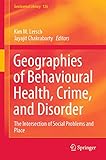Geographies of Behavioural Health, Crime, and Disorder [electronic resource] : The Intersection of Social Problems and Place / edited by Kim M. Lersch, Jayajit Chakraborty.
Material type: TextSeries: GeoJournal Library ; 126Publisher: Cham : Springer International Publishing : Imprint: Springer, 2020Edition: 1st ed. 2020Description: VI, 209 p. 25 illus., 15 illus. in color. online resourceContent type: text Media type: computer Carrier type: online resourceISBN: 9783030334673Subject(s): Human geography | Public health | Crime—Sociological aspects | Urban geography | Human Geography | Public Health | Crime and Society | Urban Geography / Urbanism (inc. megacities, cities, towns)Additional physical formats: Printed edition:: No title; Printed edition:: No title; Printed edition:: No titleDDC classification: 304.2 LOC classification: GF1-900Online resources: Click here to access online
TextSeries: GeoJournal Library ; 126Publisher: Cham : Springer International Publishing : Imprint: Springer, 2020Edition: 1st ed. 2020Description: VI, 209 p. 25 illus., 15 illus. in color. online resourceContent type: text Media type: computer Carrier type: online resourceISBN: 9783030334673Subject(s): Human geography | Public health | Crime—Sociological aspects | Urban geography | Human Geography | Public Health | Crime and Society | Urban Geography / Urbanism (inc. megacities, cities, towns)Additional physical formats: Printed edition:: No title; Printed edition:: No title; Printed edition:: No titleDDC classification: 304.2 LOC classification: GF1-900Online resources: Click here to access online Part l: Geography and Behavioral Health -- Chapter 1. The geography of mental health: An examination of police calls for service (Kim M. Lersch) -- Chapter 2. Improving estimates of the quantity and quality of persons involved in the opioid crisis (Adam D. Vaughan) -- Part ll: Geography of Crime -- Chapter 3. Crime hot spots, crime corridors and the journey to crime: An expanded theoretical model of the generation of crime concentrations (Paul J. Brantinham) -- Chapter 4. Hot spots of crime: Methods & predictive analytics (Timothy Hart) -- Chapter 5. Geographic Variations in, and Correlates of Green/Environmental Crime Across US States: A Preliminary Assessment (Michael J. Lynch) -- Part III: Geography of Disorder -- Chapter 6. Fear of Crime, Disorder, and Quality of Life (Michael Chataway) -- Chapter 7. Homelessness as a fusion policy problem (Abram Oudshoorn) -- Chapter 8. Environmental Justice in the US and Beyond: Frameworks, Evidence, and Social Action (Shawna Nadybal).
This book focuses on the intersection of place and overall community health thereby focusing on some of the most critical contemporary social problems, including the opioid crisis, suicide, socioeconomic status and ethnicity, mental illness, crime, homelessness, green criminology, and social and environmental justice. Scholars from a variety of disciplines, including geography, sociology, criminology, mental health, social work, and behavioural sciences discuss the importance of geography in our quality of life. Each chapter introduces the reader to an overview of the topic, presents theoretical frameworks and the most recent empirical evidence, and discusses real world policy implications. As such this book is a key resource for researchers, policy makers, and practitioners working in the field.
